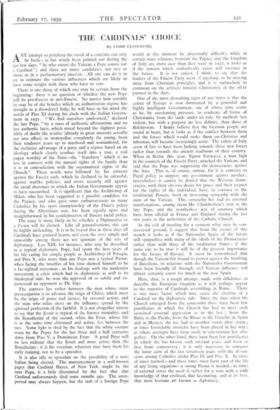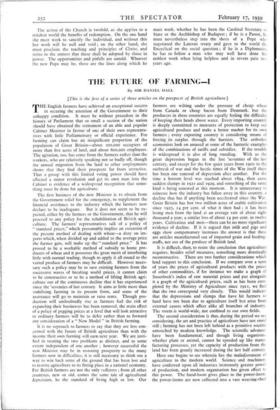THE CARDINALS' CHOICE
By LORD CLONN1ORE
ANY attempt to prophesy the result of a conclave can only be futile ; as has wisely been pointed out during the last few days, " he who enters the Vatican a Pope comes out a Cardinal "; and there are many candidates, not two or three, as in a parliamentary election. All one can do is to try to estimate the various influences which are likely to have some weight with those who have to vote.
There is one thing of which one may be certain from the beginning: there is no question of whether the new Pope will be pro-Fascist or anti-Fascist. No matter how sensible he may be of the benefits which an authoritarian regime has brought to a disordered Italy, he will have in his mind the words of Pius XI during his clash with the Italian Govern- ment in 1931. " We find ourselves confronted," declared the late Pope, " by a mass of authentic affirmations and no less authentic facts, which reveal beyond the slightest possi- bility of doubt the resolve (already in great measure actually put into effect) to monopolise completely the young, from their tenderest years up to manhood and womanhood, for the exclusive advantage of a party and a regime based on an ideology which clearly resolves itself into a true, a real pagan worship of the State—the Statolatry ' which is no less in contrast with the natural rights of the family than it is in contradiction with the supernatural rights of the Church." These words were followed by his protests against the Fascist oath, which he declared to be unlawful, against warlike policies, and more recently still against the racial doctrines to which the Italian Government appear to have succumbed. It is significant that the Archbishop of Milan, who has been suggested as a possible candidate for the Papacy, and who gave some embarrassment to many Catholics by his open championship of the Duce's policy during the Abyssinian war, has been equally open and straightforward in his condemnation of Fascist racial policy.
The issue is morc likely to be whether a Diplomatist or a Pastor will be elected. Like all generalisations, this can be highly misleading. It is to be hoped that in these days all Cardinals have pastoral hearts, and even the most simple and unworldly among them are not ignorant of the arts of diplomacy. Leo XIII, for instance, who may be described as a typical diplomatic Pope, had spent the best years of his life caring for simple people as Archbishop of Perugia, and Pius X, who more than any Pope was a typical Pastor, when facing the troubles of his time showed himself to be a far-sighted statesman ; in his dealings with the modernist movement, a crisis which had its diplomatic as well as its theological side, he won the approval of so subtle and ex- perienced an opponent as Dr. Inge.
The contrast lies rather between the man whose main preoccupation is to advance the reign of Christ, which must be the reign of peace and justice, by external action, and the man who relies more on the influence spread by the spiritual perfection of the faithful. It is not altogether untrue to say that the Jesuit is typical of the former mentality, and the Benedictine of the second, while the Friar, whose life is at the same time cloistered and active, lies between the two. Some light is shed by the fact that the white soutane worn by the Popes for the last three and a half centuries dates from Pius V, a Dominican Friar. A good Pope will be less militant that the Jesuit and more active than the Benedictine ; it is his vocation, whatever may have been his early training, not to be a specialist.
It is also idle to speculate on the possibility of a non- Italian being elected. The announcement in a well-known paper that Cardinal Hayes, of New York, might be the next Pope, is a little discounted by the fact that that Cardinal unfortunately died some months ago. The unex- pected may always happen, but the task of a foreign Pope would at the moment be abnormally difficult ; while in certain ways relations between the Papacy and the kingdom of Italy are more easy than they were in 1922, it looks as if the tension which undoubtedly exists will increase in the future. It is not unjust, I think, to say that the leaders of the Fascist Party seem, if anything, to be moving away from Christian principles, and it is melancholy to comment on the attitude towards Christianity of the otter partner in the Axis.
One of the most disturbing signs of our times is that the centre of Europe is now dominated by a powerful and highly intelligent Government, one of whose aims seems to be, by unrelenting pressure, to eradicate all forms of Christianity from the lands under its rule, by methods less violent, but with a purpose no less definite, than those of Bolshevism. I firmly believe that the German people are sound at heart, but it looks as if the conflict between them and the forces which would make them un-Christian and inhuman, will become increasingly acute. The rulers of Italy seem of late to have been looking towards these new forces rather than towards the ancient traditions of their country. When in Berlin this year, Signor Farinacci, a man high in the counsels of the Fascist Party, attacked the Vatican, and said that the Pope was supporting the democracies against the Axis. This is, of course, untrue, for it is contrary to Papal policy to support one government against another ; nevertheless, it cannot be denied that the Western demo- cracies, with their obvious desire for peace and their respect for the rights of the individual, have, in contrast to the totalitarian Powers, been in increasing sympathy with the aims of the Vatican. This sympathy has had its external manifestations, among them Mr. Chamberlain's visit to the late Pope, and the numberless acts of courtesy which have been offered in France and England during the last two years to the authorities of the Catholic Church.
At the risk of treading for a moment what may be con- troversial ground, I suggest that from the events of this month it looks as if the Nationalist Spain of the future will sympathise with many of the ideals of the Democracies rather than with those of the totalitarian States ; if this turns out to be true it will be of the greatest importance for the future of Europe. It must be remembered that though the Vatican felt bound to protest against the bombing of Barcelona, its relations with the Nationalist Government have been friendly all through, an-I Vatican influence will almost certainly count for much in the new Spain.
Here, then, is a rough attempt, made with diffidence, to describe the European situation as it will perhaps appear to the majority of Cardinals assembling in Rome. There is one more factor which may cause the election of a Cardinal on the diplomatic side. Since the days when the Church emerged from the catacombs there have been few pontificates in which the Church has had to meet such sustained external aggression as in the last ; from the Baltic to the Pacific, from the Rhine to the Danube, in Spain and in Mexico, she has had to weather storm after storm ; at times formidable obstacles have been placed in her way ; at others attempts have been made to exterminate her alto- gether. On the other hand, there have been few pontificates in which she has known such internal peace and been so free from controversy ; it is only necessary to compare the inner calm of the last seventeen years with the dissen- sions among Catholics under Pius IX and Pius X. In times of inner turmoil—and these times must form part of the life of any living organism—a strong Pastor is needed ; in times of external stress the need is rather for a man with a wide knowledge of that civilised, that fascinating, and at its best, that most humane art known as diplomacy. The action of the Church is twofold, as she applies to a stricken world the benefits of redemption. On the one hand she must work to sanctify the individual, and without this her work will be null and void ; on the other hand, she must proclaim the teaching and principles of Christ, and strive to the utmost that these shall be adopted by those in power. The opportunities and pitfalls are untold. Whoever the new Pope may be, these are the lines along which he must work, whether he has been the Cardinal Secretary of State or the Archbishop of Budapest ; if he is a Pastor, ht must nevertheless step into the shoes of a Pope who negotiated the Lateran treaty and gave to the world the Encyclical on the social question ; if he is a Diplomatist, he has to follow a man who may well have done his noblest work when lying helpless and in severe pain two years ago.











































 Previous page
Previous page